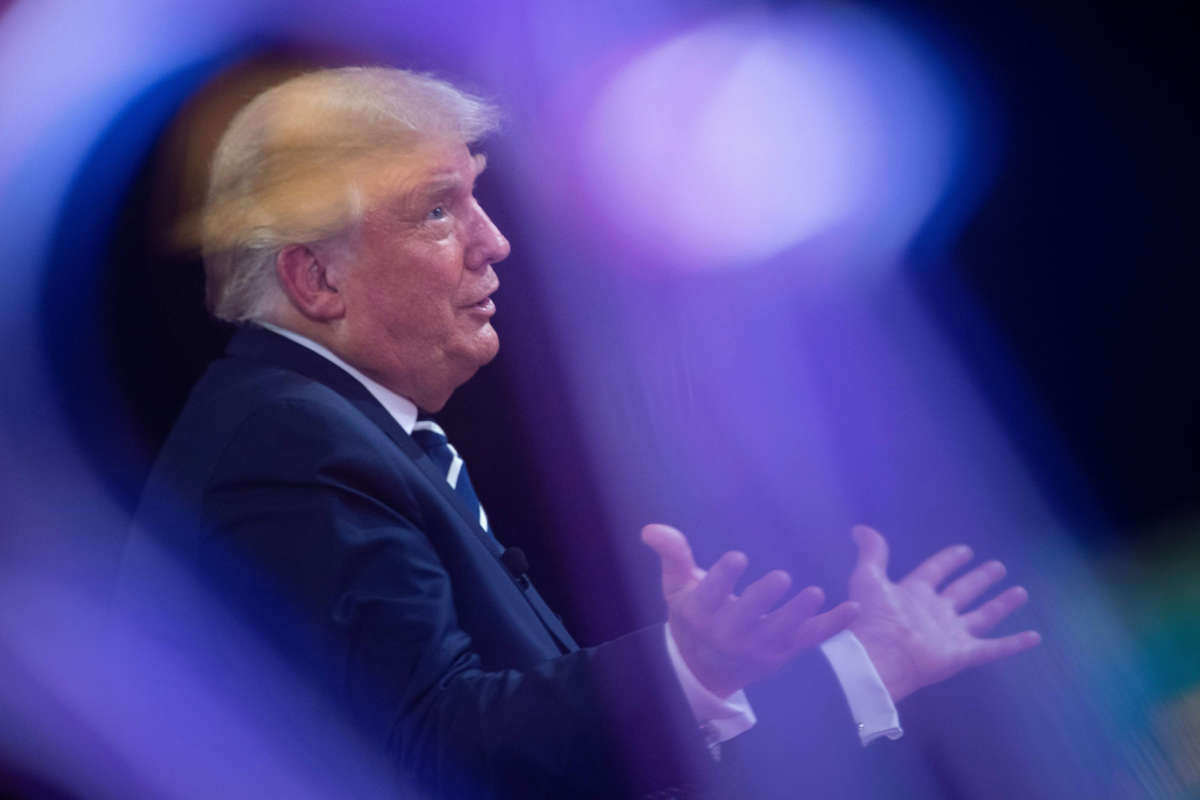During a town hall event hosted by NBC News’s Savannah Guthrie on Thursday evening, President Donald Trump refused to denounce the QAnon movement and deflected other questions regarding his promotion of conspiracy theories in general.
Trump’s demeanor during the town hall was nothing unfamiliar to anyone who has followed his presidential tenure so far — he was oftentimes combative with Guthrie, expressing frustration with her several times during the debate. He regularly complained about questions she asked, at one point calling her “so cute” after she challenged him.
When Guthrie asked the president if he would condemn white supremacy, Trump maintained that he does and has for years condemned it, despite many statements and policies demonstrating otherwise.
When the conversation on white supremacy shifted to the subject of QAnon — the conspiracy theory movement that, as Guthrie described it, pushes the false belief “that Democrats are a satanic pedophile ring and that you are the savior” — the host asked Trump if he would denounce the movement as fraudulent. After some back and forth, Trump attempted to shift the topic, but Guthrie continued to press him for an answer. The president, who in August sang the praises for the movement by describing its followers as “people who love our country,” told Guthrie on Thursday night, “I just don’t know about QAnon.”
“You do know,” Guthrie retorted.
“What I do hear about it is they are very strongly against pedophilia, and I agree with that,” Trump added.
As president of the United States, Trump likely knows more about QAnon than he admitted during the town hall — particularly because the FBI labeled the movement as a domestic threat more than a year ago.
Trump’s use of Twitter was also brought up during the town hall, particularly his habit of sharing misleading content often based on conspiracy theories. Guthrie questioned why Trump, for example, would share a tweet to his followers wrongly suggesting that his Democratic opponent in the election, Joe Biden, alongside former President Barack Obama, killed members of Seal Team Six in order to cover up the fact that Osama bin Laden was supposedly still alive.
“Why would you send a lie like that to your followers?” Guthrie asked.
“I know nothing about it,” the president responded.
“You retweeted it,” Guthrie pointed out.
Trump tried to justify himself doing so. “That was a retweet, that was an opinion of somebody, and that was a retweet,” he said. “I’ll put it out there, people can decide for themselves, I don’t take a position.”
Guthrie said she didn’t understand why Trump would make that choice, and suggested that the president of the United States shouldn’t “just retweet whatever” to his followers, particularly information that’s a flagrant lie.
Guthrie and Trump also clashed on the issue of coronavirus. Trump invoked a line he’s used in the past, arguing that “the cure can not be worse than the problem itself.”
When Guthrie tried to ask him whether 200,000 deaths due to COVID-19 indicated a failure on his part, the president interrupted her, and suggested that some governors wanted to hurt his presidential campaign through their efforts to quell the spread of the virus.
“The fact is we’re winning all these cases because it’s unconstitutional what they’re doing,” Trump said. “And I think they’re doing it for political reasons.”
In the past, Trump has suggested that adherence to social distancing rules, including the wearing of masks, were themselves political statements against his being president. While Trump didn’t say as much on Thursday, he did falsely suggest that health experts were split on the efficacy of masks.
“You have, on the masks, you have two stories. You have a story where they want, a story where they don’t want,” the president said.
“All of your public health officials, your administration, they’re in unison about this,” Guthrie responded.
“Some. No,” Trump responded.
“Scott Atkins, if you look at Scott, Dr. Scott. He’s from, great guy, Stanford. He will tell you that, he disagrees with you,” Trump continued, likely intending to say Scott Atlas, a member of his coronavirus task force who has pushed the dangerous and ethically unsound concept of an unmitigated herd immunity approach at the White House.
“He’s not an infectious disease expert,” Guthrie chimed in.
Atlas is a neuroradiologist, a specialist who deals with diagnosing issues related to the brain, spine, head and neck.
“Oh, I don’t know. Look, he’s an expert, he’s one of the great experts in the world,” Trump insisted.
A number of studies have demonstrated that wearing masks in public have successfully helped to stem the spread of COVID-19.
Join us in defending the truth before it’s too late
The future of independent journalism is uncertain, and the consequences of losing it are too grave to ignore. To ensure Truthout remains safe, strong, and free, we need to raise $47,000 in the next 8 days. Every dollar raised goes directly toward the costs of producing news you can trust.
Please give what you can — because by supporting us with a tax-deductible donation, you’re not just preserving a source of news, you’re helping to safeguard what’s left of our democracy.
